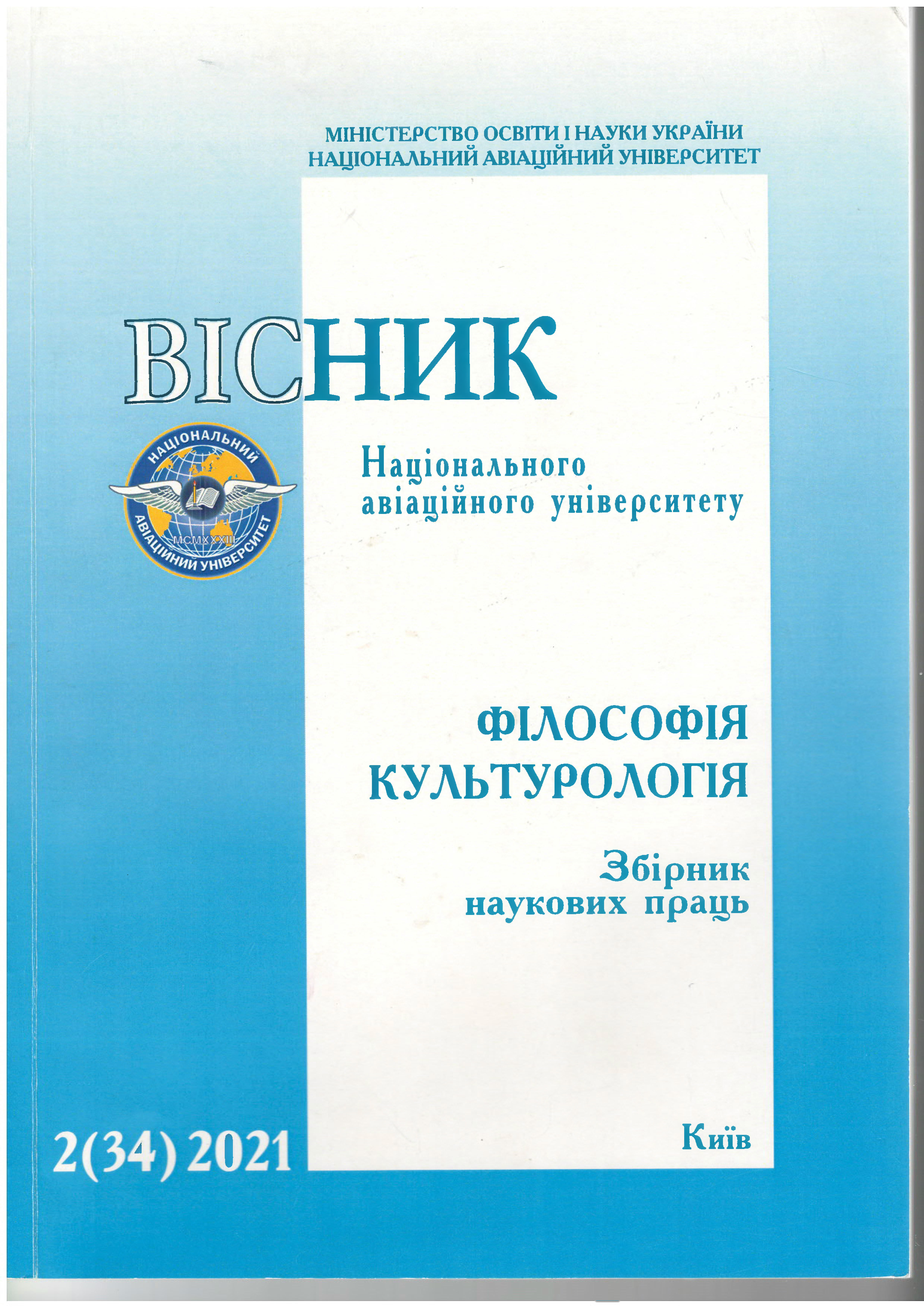ENVIRONMENTAL CONSCIOUSNESS FORMATION AS A RESPONSE TO THE CURRENT CHALLENGES
DOI:
https://doi.org/10.18372/2412-2157.34.16319Keywords:
ecological philosophy, ecological consciousness, civilization, culture, ecological crisis, global problemsAbstract
Introduction. The challenges of the global order prove that it is environmental issues that demonstrate the level of self-awareness of both
society as a whole and the individual. The idea that the vital need of today is the formation of ecological consciousness and the need to
green all its other forms is substantiated in the works on the philosophical problems of ecology. The aim and tasks. The aim of this study is
to identify the content of the phenomenon of ecological consciousness, as well as those transformations in culture and civilization that
provoked the development of ecological philosophy. The aim and tasks. The theoretical foundations of the study are the works of
philosophers and scientists who analyzed the transformations in European culture that changed man's attitude to nature. It will be
appropriate to apply the method of comparative analysis, as well as system-logical and structural research methods. Research results. The
analysis of the main causes of global problems requires a return to the times when philosophers and scientists began to cover the
transformations of society and the individual, which, they said, led to spirituality and practicality. The essence of modern world problems
must be sought not in external factors, but in man. The social consciousness has finally accepted the threat of a planetary catastrophe as
real. Specialists in various fields of science make every effort to find ways to solve environmental problems. An important result of many
studies has been the necessary realization to develop a paradigm of progress that would be based on self-restraint, on changing the types
of production in order to reduce its growth. Discussion Mankind has a close ecological, demographic connection, without feeling the unity in
the cultural and civilizational sense. Modern civilizations are at different levels of economic development and therefore have different
opportunities in solving environmental problems. In philosophical studies of ecology the position on necessity of formation of ecological
consciousness is substantiated. Environmental philosophy as a separate area of research which aims to develop a strategy of action that
will at least slow down, if not stop the deepening of the current environmental crisis is being actively developed. The problem of coevolution
of man and the biosphere is fundamental to ecological philosophy.
References
Список літератури
Семенова С. Г. Николай Федоров. Творчество жизни /
С. Г. Семенова. – М., 1990.
Вернадський В. И. Живое вещество и биосфера / В. И.
Вернадский. – М.: Наука, 1994. – 672 с.
Гейзенберг В. Шаги за горизонт / В. Гейзенберг. – М.:
Прогресс, 1987. – 368 с.
Бердяев Н. А. Смысл истории. Новое средневековье /
Н. А. Бердяев. – М.: Канон+РООИ "Реабилитация", 2016. –
с.
Мокляк Л. І. Природа як духовна цінність у становленні
культури сучасного українського суспільства / Л. І. Мокляк, Г.
М. Покотило // Вісник Національного авіаційного університету.
Серія: Філософія. Культурологія: Збірник наукових праць. –
Вип. 2(22). – 2015. – С. 135-140.
Рио-де-Жанейрская декларация по окружающей среде
и развитию. Принята Конференцией ООН по окружующей
среде и развитию, Рио-де-Жанейро, 3-14 июня 1992 г. Текст
Декларації взято з сайту Організації об’єднаних націй
http://www.un.org/ru/documents/decl_conv/declarations/riodecl.sh
tml
Крымский С. Б. Философия как путь человечности и
надежды / С. Б. Крымский. – К.: Курс, 2000. – 308 с.
Тейяр де Шарден П. Феномен человека / П. Тейяр де
Шарден. – М.: Наука, 1987. – 240 с.
Кримський С. Б. Цивілізаційний розвиток людства /
С. Б. Кримський, Ю. В. Павленко. – К.: Вид-во «Фенікс», 2007.
– 316 с.
Родоман Б. Б. Гуманизм, экология и рыночные
отношения / Б. Б. Родоман // Здравый смысл, 2007. – № 3.
Жибуль И. Я. Экологические потребности: сущность,
динамика, перспективы / И. Я. Жибуль; под ред. А. И.
Савастюка; АН БССР, Институт философии и права. – Минск:
Навука i тэхнiка, 1991. – 181[2].
Карако П. С. Экологическая философия - одно из
направлений современной философии / П. С. Карако. –
Минск, 2009. – С. 11-17.
Букчин М. Реконструкция общества: на пути к
зеленому будущему / М. Букчин. – Нижний Новгород, 1996.
Кобылянский В. А. Философия экологии: общая теория
экологии, геоэкология, биоэкология / В. А. Кобылянский. – М.,
Вернадский В. И. О науке / В. И. Вернадский. Т. 1. –
Дубна, 1997.
Сахроков В. А. Экофилософия культуры ислама / В. А.
Сахроков, К. И. Шилин. – М., 2001.
Хулль Э. Экософская философия природы / Э. Хулль
// Философия природы сегодня. – М.: Издательство Канон-
Плюс, 2009. – 512 с.
Пода Т. А. Інформаційна війна як стратегія формування
політичної свідомості / Т. А. Пода // Вісник Національного
авіаційного університету. Серія: Філософія. Культурологія:
Збірник наукових праць. – Вип. 1(19). – 2014. – С. 67-70.
Лисеев И. К. Природа в современном философском
дискурсе / И. К. Лисеев // Философия природы сегодня. – М.:
Издательство Канон-Плюс, 2009. – 512 с.
Скиба О. П. Екологічна культура як складова духовності
сучасної людини / О. П. Скиба // Вісник Національного авіаційного
університету. Серія: Філософія. Культурологія: Збірник
наукових праць. – Вип. 1(33). – 2021. – С. 146-149.

